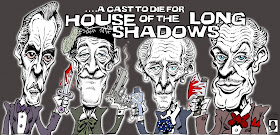In the Spring of 1982, Michael Armstrong and director Pete Walker approached Cannon Films, with Armstrong's supernatural thriller, Deliver Us From Evil. With his love of star packages, however, the head of Cannon, Menaham Golan was far more interested in them developing a package for cinema's horror legends: Peter Cushing, Christopher Lee, Vincent Price and John Carradine, who had never throughout their long careers, actually appeared on screen together as a foursome. Golan felt this would be a last opportunity to create cinema history.
Walker and Armstrong knew that the current trend of teen slasher movies were not only unsuitable, but would fail to attract the stars in question. There had been several attempts to put them together in one film over the years, but each had failed because of the subject matter and the screenplay. Both Lee and Cushing, in particular, had often stated their dislike of the latest horror trends.Walker, therefore, suggested the remaking of an old classic, The Old Dark House, but was unable to secure the rights from Universal. Aware that if they failed to get back to Cannon quickly, they may lose the offer, Walker suggested another classic title from the same era, Seven Keys To Baldpate.
Seven Keys To Baldpate, had started life as a novel by the creator of Charlie Chan, E. Digger Biggs and then been dramatised for the stage by George M. Cohen. They became a long running hit on Broadway, before being made into a silent movie back in 1917, directed by Hugh Ford, with George M. Cohen as George Washington Magee! Hedda Hopper starred opposite him. In 1925, yet another silent version was made of the story directed by Fred C. Newmeyer. The first sound version was produced in 1929 by Reginald Barker, starring Richard Dix as William Magee. 1935 rolled out another version, directed by William Hamilton. The final version was made in 1947 with Lew Landers directing, starring Phillip Terry as the renamed Kenneth Magee and Jaqueline White as the also renamed Mary Jordan.
Walker laid on screenings of several versions at his flat for writer Armstrong and Jenny Craven, a friend of Armstrong and Golan, who would eventually act as associate producer on The House of Long Shadows.
Armstrong recalls: We ignored a 1916 version made in Australia and a television version 1946, neither of which seemed relevant or connected with the book or the play, and watched - I can't remember maybe two or three, including the last one made in 1947- What we hoped would be a Gothic mystery thriller, along the lines of The Old Dark House, turned out to be an extremely dated crime thriller and nothing remotely suitable for the cast we had in mind. Over dinner we decided the only thing we could do was take the basic premise and the end twist and create a completely new storyline to suit our needs.'
'As I was going to be writing specifically for our four stars, it seemed logical to pay homage to the movies with which they had all been associated and create a tongue in cheek pastiche of the Gothic movies incorporating as many genre movies references as possible. Certain that our cast would be drawn to the idea of parodying their own classic images, we became very excited, ordered some more wine and set about creating a long list of everything we could think of from that era- thunder storms, to cats jumping out, to the inevitable 'monster locked behind the door', forever screaming heroines and menacing dialogues of 'things better not spoken of...'
To add further frisson of excitement to their discussion, Walker suggested they create a part for the original Bride Of Frankenstein, Elsa Lanchester.
Because of the urgency to cement the deal, Armstrong returned home that night and within twenty four hours had produced a detailed twenty page treatment, so Walker could fly off to LA and quickly secure their stars. A few days later, Armstrong received a late night phone call from Walker, telling him the stars liked the treatment and were interested, subject to the screenplay - which he had told them was on the point of completion and would be available for them to read within two weeks.
'I've never been a slow writer, but to complete a screenplay within two weeks and be sufficiently polished to hook star names? It was quite ironic really. The film was about a writer taking on a bet to write a Gothic novel within twenty four hours! And here was I agreeing to write a Gothic screenplay within two weeks! So, I locked myself away with my typewriter, reams of paper, an ample supply of whiskey and enough cartons of cigarettes to open a tobacconists shop - in those days I was smoking 120 cigarettes a day! - and with Verdi's La Forza (Guiseppe Verdi's opera, La Forza Del Destino - The Force of Destiny) drowning out any distracting noises from the outside world, I sat down and went to work!'
TO BE CONTINUED......PART TWO: ALL ONE BIG HAPPY FAMILY.






No comments:
Post a Comment
WE ENCOURAGE YOUR COMMENTS AND OPINIONS ABOUT OUR POSTS. FEEL FREE TO LEAVE A COMMENT.